Covid in Scotland: Answers to your questions
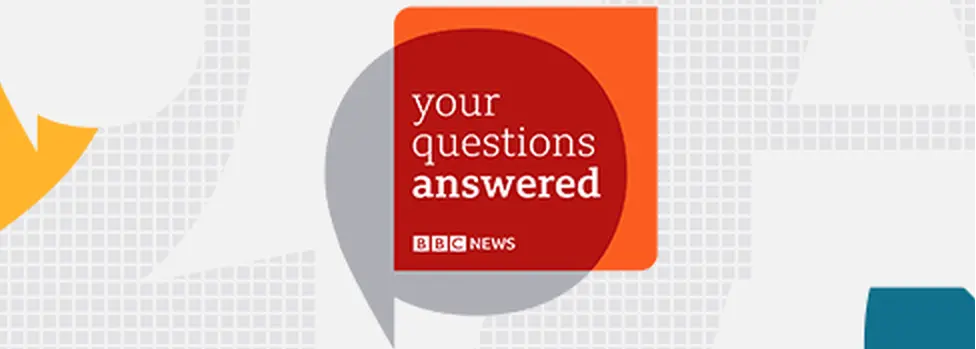 BBC
BBC The spread of the Omicron variant means the situation in Scotland is changing rapidly. On Tuesday, Nicola Sturgeon said there were indications that this wave of the epidemic in Scotland was "at or close to" the peak.
BBC Scotland has been asking our audience what they would like to know about this wave of the pandemic - and how the current restrictions will affect them.
We've looked through the hundreds of questions sent in recently by readers and selected some to answer.
I have self-isolated after a positive test six days ago, and have now another positive test result - what is the next step? Question from Cathy in Edinburgh
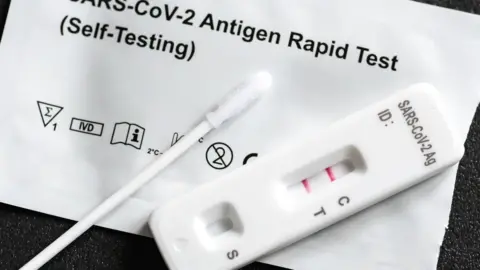 Getty Images
Getty ImagesCathy tested positive on 5 January. The new rules on leaving isolation early if you test negative came in on 6 January, so don't apply to her.
She must self isolate for the full 10 days, regardless of her lateral flow results on day six and seven.
After 10 days, she can leave isolation if her symptoms have gone, or if the only symptoms she still has are a cough or anosmia (a lost or changed sense of smell), which can last for weeks.
If she still has a high temperature after 10 days or is otherwise unwell, she should continue to stay at home and seek medical advice.
However, new rules came into place on 6 January. Anyone who tests positive on or after that date can end self-isolation after a week - if they don't have a fever AND test negative on a lateral flow device on day six and again at least 24 hours later on day seven.
If I continue to test positive with a lateral flow test 10 days after my first symptoms, do I still have to self-isolate? I have no symptoms. Question from May in Glasgow
No, in your case you do not - because you have no symptoms.
The guidance from NHS Inform says: "If you continue to test positive on lateral flow tests, you can return to work and your usual activities on the 11th day after your symptoms started, as long as you feel better and do not have a high temperature."
How can I get a Covid passport? Question from Ann in Haddington
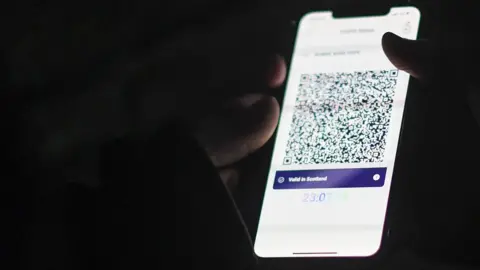 Getty Images
Getty ImagesYou need a Covid passport to get into certain "higher risk settings" in Scotland.
These include nightclubs and large events. The first minister has said that next week, cabinet will consider expanding the places where a Covid passport will be needed for entry.
You can get a Covid passport a few ways.
You can download the NHS Scotland Covid Status app onto your mobile device, for example onto your smartphone (if you have one).
Or, you can download or request a copy of your vaccination status online or by phoning the Covid status helpline on 0808 196 8565.
Does the three-households rule still apply to private gatherings? Question from Donald in Edinburgh
 Getty Images
Getty ImagesYes, the guidance is still to limit mixing to three households. Nicola Sturgeon confirmed this when she addressed MSPs on Tuesday.
Before Christmas, the first minister made what she called a "request" to the public to "reduce as far as possible - to a minimum - the contacts that we have with people from other households".
She said mixing between households was not going to be banned or restricted in law, as happened before. Instead, she said her government would be issuing "strong guidance" to "cut down as far as possible the number of people from outside our own households with whom we interact".
Ms Sturgeon did ask those who were going to socialise - either at home or in indoor public places - to limit each gathering to a maximum of three households, and for everyone to do a lateral flow test beforehand.
I was on a bus in Glasgow and it was packed. Are the bus and train operators going to be obliged to reinstate social distancing? Question from Nina in Glasgow
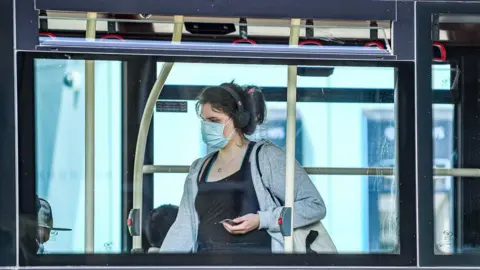 Getty Images
Getty ImagesThere are currently no Covid capacity limits or social distancing requirements on public transport.
There has been no suggestion from the government either that these will be reintroduced.
However, the legal requirement to wear a face covering on public transport remains (unless you are exempt).
Do you need to take a lateral flow test before using public transport? Question from Joe in Perthshire
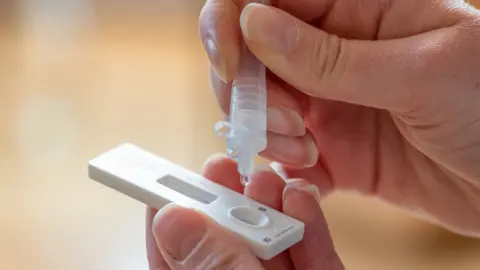 Getty Images
Getty ImagesThere is no legal requirement to take a lateral flow test before using public transport in Scotland.
However, everyone is encouraged to take a test at least twice a week, and if you're going out to work or socialise, you should take one before you leave home.
On public transport you must by law wear a face covering, unless you are exempt.
One of the main challenges for people using trains, buses, trams and the Glasgow Subway in the coming weeks will be the cancellation of services due to staff shortages.
ScotRail is currently running a slimmed down timetable as it struggles to cope with levels of staff absence.
My mum is in the Edinburgh Royal Infirmary. What are the rules on visiting now? Question from Larry in Edinburgh
 Getty Images
Getty ImagesNHS Lothian's current visiting rules state that visiting is currently restricted to one "designated" visitor per patient.
The health board says the designated person can change, for example if that person becomes unwell and unable to visit.
Most wards will offer a timed visiting appointment per day per patient.
There are exceptions to the "one visit per day" rule for patients receiving end of life care and patients with dementia or experiencing stress and distress.
If you are going to visit someone in hospital, you should:
- Take a lateral flow test before visiting, and don't go if it is positive
- Wear a face covering throughout your visit to the hospital
- Use hand sanitiser
- Observe 2m physical distancing from everyone not in your household
The rules are decided by health boards, so check the rules of the hospital you're visiting before you go.


Do you have a question about the Covid restrictions in place in Scotland? Or about what the Omicron variant means for your Christmas plans? Use the form below to ask us what you want to know, and we could be in touch.
In some cases your question will be published, displaying your name, age and location as you provide it, unless you state otherwise. Your contact details will never be published. Please ensure you have read the terms and conditions.
If you are reading this page on the BBC News app, you will need to visit the mobile version of the BBC website to submit your question on this topic.
